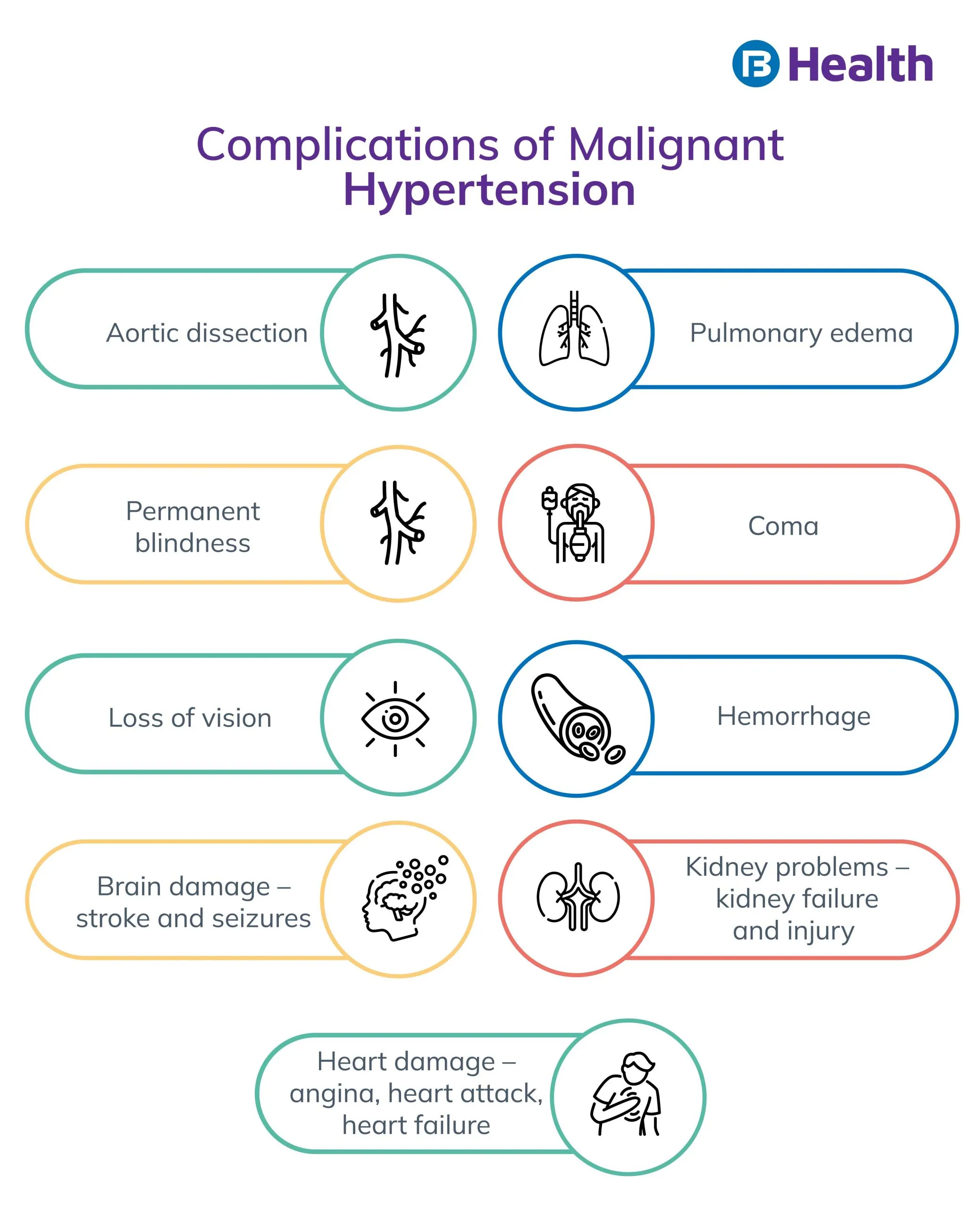Hypertension | 4 min read
Malignant Hypertension: Risk, Symptoms, Complications, Type
Medically reviewed by
Table of Content
Key Takeaways
- People with malignant hypertension have blood pressure above 180/120 mm Hg
- Uncontrolled high blood pressure is a major cause of malignant hypertension
- Malignant hypertension patients are given blood pressure medicines intravenously
Malignant hypertension is one of the types of hypertension that appears suddenly and quickly. Also known as hypertensive crisis, this extremely high blood pressure occurs rapidly and causes organ damage. Blood pressure in people with malignant hypertension is typically above 180/120 mm Hg, much above the normal range of 120/80 mm Hg.
This medical emergency mostly occurs in people who are already diagnosed with hypertension or high blood pressure. However, conditions like kidney injury can also cause this. In India, hypertension is the foremost health-related risk where about 25% rural and 33% of urban Indians are hypertensive [1, 2]. Malignant hypertension however is rare. Only about 1% of people with a history of hypertension develop this condition. As you now understand the malignant hypertension definition or meaning, read on to know about its causes, symptoms, and treatment.
Risk Of Malignant Hypertension
Malignant hypertension is a rare occurrence. According to statistics, only 1% of those with a history of high blood pressure acquire this potentially fatal illness.
Men, African-Americans, and those in lower socioeconomic levels are more likely to acquire it. The danger is increased by limited access to healthcare.
Additional Read: Pulmonary Hypertension
Symptoms Of Malignant Hypertension
The major sign of malignant hypertension is elevated blood pressure of 180/120 mm Hg or higher. Its symptoms depend on the organ affected. Here are some common ones:
- Bleeding and swelling in the tiny blood vessels of the retina
- Blurry vision
- Angina or chest pain
- Breathing difficulties
- Dizziness
- Weakness or numbness in face, arms, and legs
- Severe headaches
- Anxiety
- Confusion
- Decreased alertness
- Lack of concentration
- Fatigue
- Restlessness
- Sleepiness
- Cough
- Nausea or vomiting
- Decreased output of urine
- Seizure
- Delirium
- Lower back pain
- Mood changes
Causes Of Malignant Hypertension
Uncontrolled high BP is the major cause of malignant hypertension. You are at an increased risk of developing this condition if you are a male, have kidney failure or renal hypertension.
Here is a list of some causes.
- Kidney disease
- Spinal cord injuries
- Adrenal gland tumor
- Thyroid disorders
- Adrenal disorders
- Renal artery disease
- Structural heart disease
- Illegal drugs like cocaine
- Toxemia - pregnancy-induced hypertension
- Scleroderma and other collagen vascular disease
- Certain drugs and medications like birth control pills
- Substance and medication withdrawal
- Central nervous system disorders including stroke, brain injury, or brain bleed
Types Of Malignant Hypertension
There are two types of malignant hypertension.
Hypertensive emergency
It occurs when a rise in blood pressure occurs along with signs of organ damage. It requires immediate medical attention.
Hypertensive urgency
It occurs when your blood pressure is abnormally high but it does not show any signs of organ damage.
Malignant Hypertension Diagnosis
Your doctor will assess your symptoms, blood pressure, and signs of organ damage to diagnose you with either hypertensive urgency or hypertensive emergency. The type of tests you undergo depends on the symptoms you may have.
If you have symptoms, your doctor will check your blood pressure and listen to the abnormal sounds of the heart and lungs. They may also examine your eyes for symptoms. You may be ordered blood tests including blood urea nitrogen (BUN), blood clotting tests, blood sugar level, complete blood count, sodium and potassium levels, and urinalysis.
Apart from the blood and urine tests, your doctor may ask you to undergo imaging tests.
- Echocardiogram to evaluate heat function
- Electrocardiogram to check the electrical function of the heart
- Chest x-ray to detect signs of pulmonary edema
- Imaging test to evaluate kidneys and renal arteries
Malignant Hypertension Treatment
People with malignant hypertension need immediate hospitalization as it is a medical emergency. Doctors will analyze your symptoms and decide on a treatment plan. Its patients are often admitted to the intensive care unit and are given blood pressure medicines intravenously as it is the fastest way to treat elevated blood pressure. When it becomes stable, doctors may prescribe oral medications. Kidney dialysis may be required too. In some cases, treatment for hypertension depends on specific symptoms and possible causes of the condition.
Additional Read: Renal HypertensionComplications Of Malignant Hypertension
It is fatal if left untreated. Malignant hypertension complications might also include:
- An abrupt rupture of the major blood artery leaving the heart is known as an aortic dissection
- Coma
- Pulmonary oedema (fluid in the lungs)
- Chest pain
- Heart attack
- Stroke
- Unexpected renal failure
Your risk of developing potentially fatal consequences is reduced by seeking immediate medical attention.
Several Ways to Prevent Malignant Hypertension
Anyone, even toddlers, can have a hypertension emergency. However, people diagnosed with high blood pressure are more vulnerable.
As a result, if you suffer from chronic hypertension or your family has a history of hypertension, it would be wise to:
- Keep an eye on your blood pressure frequently
- Consume a balanced diet low in sodium and saturated fats, and take your medications as directed by your doctor
- Stop smoking and try quitting
- Keep a healthy weight
High blood pressure can be controlled through medications and lifestyle changes like quitting smoking, limiting alcohol intake, and eating healthy. Along with this, you should take proper medical care. For the best medical attention, book online consultation with doctors and specialists on Bajaj Finserv Health to make your health a priority.
References
- https://nhm.gov.in/images/pdf/guidelines/nrhm-guidelines/stg/Hypertension_full.pdf
- https://www.ncbi.nlm.nih.gov/pmc/articles/PMC4011565/#:~:text=Results%3A,37.8)%3B%20P%20%3D%200.05%5D
Disclaimer
Please note that this article is solely meant for informational purposes and Bajaj Finserv Health Limited (“BFHL”) does not shoulder any responsibility of the views/advice/information expressed/given by the writer/reviewer/originator. This article should not be considered as a substitute for any medical advice, diagnosis or treatment. Always consult with your trusted physician/qualified healthcare professional to evaluate your medical condition. The above article has been reviewed by a qualified doctor and BFHL is not responsible for any damages for any information or services provided by any third party.





